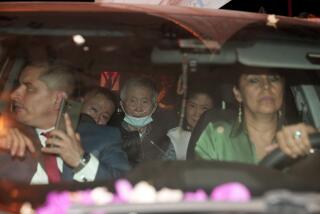Egypt’s Hosni Mubarak returns home after years-long detention
If the removal of Hosni Mubarak from the Egyptian presidency six years ago marked the peak of the Arab Spring uprisings, his return home a free man on Friday was a reminder for many that those revolutions all but failed.
Mubarak, whose three-decades in power ended with hundreds of thousands shouting for his ouster in 2011, was released Friday morning from the Armed Forces hospital in the Cairo neighborhood of Maadi with little fanfare. Local media reported that he had breakfast with family and friends at his mansion in Cairo’s Heliopolis district.
Egypt’s highest appeals court cleared him earlier this month of charges that he ordered the killings of the hundreds of people who died in protests against him.
“The only news I have is that he has been released from the hospital today and is at his house in Heliopolis,” Mubarak’s lawyer, Farid Deeb, in a phone interview on Friday. “He does not have any charges or demands against him legally and is free to go home.”
The 88-year-old former president had already served a three-year sentence for embezzlement of funds meant to maintain and renovate presidential palaces.
He remains under investigation in other corruption cases and is therefore not allowed to travel, said Yasser Ahmed, the lawyer representing the victims’ families against Mubarak.
When Mubarak stepped down as president, national euphoria soon gave way to dissatisfaction with his democratically elected successor, Mohammad Morsi.
In 2013, Morsi was imprisoned in a coup and eventually replaced by Abdel Fatah Sisi. A former general, Sisi has led a crackdown on Islamists and many of the pro-democracy activists who had once fought against Mubarak.
Mubarak’s acquittal and the muted response to his release was proof to many that the revolution had “died,” said Youssef Sallam, who was involved in the original protest movements during his student days.
“It upsets me that this hasn’t caused anxiety, despair, or depression — things you don’t even need to act out to feel,” he said.
He said the revolution’s death was “something you have to deal with every day. But to feel that it has died and also been forgotten — that is what is disconcerting to me.”
Mona Nessim, another veteran of the protests, saw the release as part of a larger problem: the failure to democratize government institutions.
“I can’t see his release as unrelated to the fact that neither the Ministry of Interior nor the Ministry of Justice have undergone serious reform to ensure the validity of the trial process,” she said.
“But what it does signal is that, within its process, none of the demands made for reforming key institutions were met, and the outcome of this trial is the outcome of that failure.”
Mai Sadany, a fellow at the Cairo-based Tahrir Institute for Middle East Policy, said the release was further proof that Egypt under Sisi was an echo of the Mubarak era.
Mubarak’s release “sends a very strong message to the Egyptian people that impunity remains and human rights violations perpetrated against everyday citizens are likely to remain undocumented, unaddressed, and ignored,” he said.
Special correspondents Medhat and Bulos reported from Cairo and Beirut respectively.
ALSO
Egypt’s Mubarak acquitted in final ruling on 2011 protester deaths
Egypt’s Christians feel safer under Sisi, but bias and injustice persist
Five years later, the voices of dissent are long gone from Tahrir Square
UPDATES:
2:10 p.m.: This article was update with political analysis from Times correspondents.
This article was originally published at 6:35 a.m.
More to Read
Start your day right
Sign up for Essential California for news, features and recommendations from the L.A. Times and beyond in your inbox six days a week.
You may occasionally receive promotional content from the Los Angeles Times.







